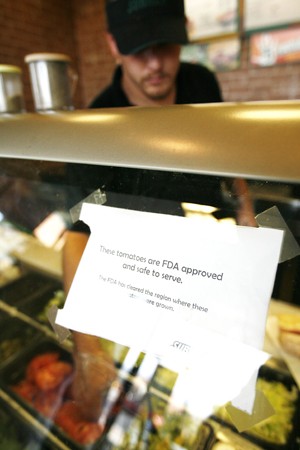Although campus diners will have to wait a little longer, students can look forward to the prospect of salmonella-free tomatoes in the near future.
In response to a June 7 Food and Drug Administration warning of a nationwide outbreak of Salmonella Saintpaul in some types of tomato, all restaurants on campus stopped serving tomatoes in mid-June and most restaurants around the university followed suit. As the areas associated with the outbreak have begun to be identified and contained, however, many establishments are bringing their tomatoes back.
“”We didn’t really notice it affecting business much,”” said Jack Tate, manager of the Chipotle Mexican Grill, 905 E. University Blvd. “”When the initial outbreak was reported, we stopped serving tomatoes as a precautionary measure, but since none of our food was contaminated we started serving them again last week.””
Tate said the decision was their standard corporate response to any outbreak of a foodborne illness.
On campus, Student Food Service made the decision to ban all tomatoes from restaurants until the FDA has completely identified the sources and areas of the contamination. Unlike many restaurants in Tucson, they have not yet brought tomatoes back, but school officials say it could be as soon as a matter of days.
“”Why take a chance?”” said Kristi Van Os, an office specialist for Student Food Service. “”Why would we want people to risk getting sick?””
According to the Centers for Disease Control and Prevention, the outbreak occurred sometime between April 10 and June 1 and is linked to raw Roma, plum and red round tomatoes and products that contain them. The specific strain of salmonella was considered very rare before the outbreak occurred.
The FDA reports that 613 cases of salmonella have been documented since the outbreak in 28 states, including Arizona.
While symptoms such as fever, nausea and abdominal pain are comparatively mild and no deaths have been directly linked to the outbreak, salmonella has been proven to be fatal in rare cases involving children, the elderly and those with weakened immune systems.
While the FDA initially estimated at the beginning of the outbreak that the scare would have a significant impact on businesses, most local store owners agree that the impact has been minimal.
“”It really hasn’t been that big of a deal,”” said Steve Massina, a manager at No Anchovies Pizza on 870 E. University Blvd. “”The tomatoes we use for our sauces and on our pizzas were identified as not being connected with the outbreak, so the only real action we’ve had to take is to temporarily eliminate them from our sandwiches.””
The FDA has compiled a list of several areas that have been ruled out as possibly affected by the outbreak, which it updates daily on its Web site. Subway, 501 N. Park Ave., is among the university-area restaurants taking advantage of the list.
After initially taking tomatoes off the menu, the Subway restaurant now offers FDA-approved tomatoes shipped from salmonella-free areas in California, Subway officials said.
As the incident appears to be drawing to a close for many restaurants and food chains, some restaurant workers have speculated that the scare might have been blown out of proportion.
“”In the end, yeah, everyone probably overreacted a little to the whole thing like they usually do whenever there’s a food-borne illness scare,”” said Cindy Torrez, a worker at Taco Bell, which recently began serving tomatoes again. “”But in the long run it’s always better to be safe than sorry.””









